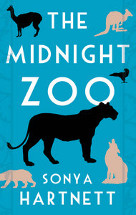Midnight zoo by Sonya Hartnett

Viking, 2010. ISBN 978 0670074051.
(Ages 12+) Fable, Recommended. Two boys wander through a war ravaged
landscape, scavenging for food,
sleeping rough. The younger boy, Tomas, carries a most important
parcel, his baby sister, Wilma. Looking for a place to sleep for the
night, they pull aside a fence and see grass, but a wolf leaps out at
them and they run away, knowing that they will not be able to escape.
But the wolf does not follow, and looking back they see that they have
come across a small zoo, and so stop.
But the animals have voices, and tell the children about what has
happened. Both the keeper and his daughter have not returned as they
said they would, the animals are starving and have no water. The boys
share their meagre food sack with them. In telling their stories the
animals expose the cruelty of what has happened to the village. The
keeper's daughter led a terrorist group which blew up the train
carrying arms and equipment to the soldiers. In so doing the leader
wreaked havoc upon the town, despite the keeper taking the lion and the
cubs to the leader in reparation. The daughter, Alice, meanwhile, fled
to the hills. So now the animals are left caged and alone, next to a
bombed out village.
Hartnett's fable illustrates the greed and war mongering nature of men,
but out of the squalor comes optimism, as the boys try to find a way
for the animals to escape their fate. When almost all hope is
gone,
Andrej tells them the story of their escape, of their freedom and
through the story comes hope. It's as if freedom can be garnered
through story in the minds of the children and the animals. The
parallel of the boys and the animals strikes at the heart of the novel,
as the issues of freedom and the various forms of restrictions imposed
upon the main characters are explored. An extraordinary and powerful
read, my heart was in my throat on every page, as the children
desperately tried to find an answer to the problem of the caged animals
as well as their own survival. It will give rise to many discussions
about the nature of freedom and the hope engendered in story.
Fran Knight